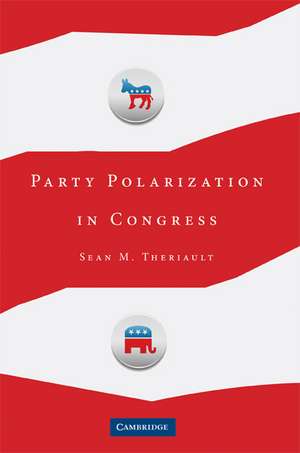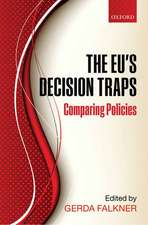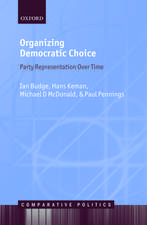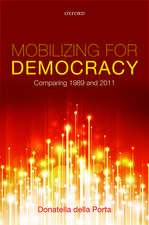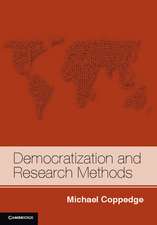Party Polarization in Congress
Autor Sean M. Theriaulten Limba Engleză Paperback – 10 aug 2008
| Toate formatele și edițiile | Preț | Express |
|---|---|---|
| Paperback (1) | 236.78 lei 6-8 săpt. | |
| Cambridge University Press – 10 aug 2008 | 236.78 lei 6-8 săpt. | |
| Hardback (1) | 446.05 lei 6-8 săpt. | |
| Cambridge University Press – 17 aug 2008 | 446.05 lei 6-8 săpt. |
Preț: 236.78 lei
Nou
Puncte Express: 355
Preț estimativ în valută:
45.31€ • 48.45$ • 37.78£
45.31€ • 48.45$ • 37.78£
Carte tipărită la comandă
Livrare economică 18 aprilie-02 mai
Preluare comenzi: 021 569.72.76
Specificații
ISBN-13: 9780521717687
ISBN-10: 052171768X
Pagini: 254
Ilustrații: 17 tables
Dimensiuni: 152 x 229 x 15 mm
Greutate: 0.41 kg
Ediția:1
Editura: Cambridge University Press
Colecția Cambridge University Press
Locul publicării:New York, United States
ISBN-10: 052171768X
Pagini: 254
Ilustrații: 17 tables
Dimensiuni: 152 x 229 x 15 mm
Greutate: 0.41 kg
Ediția:1
Editura: Cambridge University Press
Colecția Cambridge University Press
Locul publicării:New York, United States
Cuprins
1. Party polarization in the US Congress; Part I. Building Blocks for Explaining Party Polarization: 2. A brief history of party polarization; 3. Explanations for party polarization; Part II. Constituency Change: 4. Redistricting; 5. The political and geographic sorting of constituents; 6. Extremisms of party activists; Part III. Institutional Change: 7. Connecting constituency change to institutional change; 8. The interaction in the legislative process; 9. The link between the House and Senate; 10. Procedural polarization in the US Congress.
Recenzii
“Sean Theriault has done something far too rare in the study of American politics: provided a truly synthetic account of a vital political development, the dramatic polarization of Congress over the last generation. Mixing rigorous analysis with revealing stories and careful consideration of alternative explanations, Theriault’s book is a one-stop source for those wishing to understand why Republicans and Democrats just can't get along in the modern Congress.”
-Jacob S. Hacker, Professor of Political Science, University of California, Berkeley
“Sean Theriault gracefully integrates the many explanations that have been offered for the increasing party polarization evident in the US Congress. He compellingly argues that as congressional districts become more homogeneous, party leaders become stronger and thus better positioned to employ procedural strategies that exacerbate party polarization. All told, Party Polarization in Congress is a creative, synthetic, and extremely valuable treatment of one of the most intensely studied topics in modern American politics.”
-John R. Hibbing, University of Nebraska-Lincoln
“Probably no topic has received more attention from analysts of American politics over the last couple of decades than partisan polarization. In this book, Sean Theriault has substantially advanced our understanding of the many facets of that phenomenon. He deals with the electoral sources of polarization, including the roles of redistricting, geographic sorting, and party activists. Theriault also assesses the relationship between these electoral roots and the evolution of legislative procedures, and their effect in turn on elite polarization in both the House and Senate. This is an exceptional book, valuable and accessible to congressional researchers and undergraduate students alike.”
-David Rohde, Duke University
“Sean Theriault’s Party Polarization in Congress is an excellent place for readers who want to start thinking about the challenge of polarization in a more rigorous and systematic fashion….Theriault makes a significant contribution to the discussion about polarization that should impact both policymakers and voters.”
-Julian E. Zelizer, Huffington Post
“In Party Polarization in Congress, Sean Theriault excellently presents and tests some of the main explanations for why polarization has occurred recently in Congress…Party Polarization in Congress is an excellent addition to the literature on how parties within Congress have changed over time. As Theriault helpfully demonstrates, it is not necessary to think of each of the explanations of polarization as competing with one another. In fact, as Theriault does here, it is likely more helpful to include each of the explanations into one coherent model that gives researchers more insight into how the polarization process in Congress has occurred.”
-Walt Jatkowski III, Carl Albert Center Fellow, University of Oklahoma, APSA Legislative Studies Section Newsletter, Book Notes
-Jacob S. Hacker, Professor of Political Science, University of California, Berkeley
“Sean Theriault gracefully integrates the many explanations that have been offered for the increasing party polarization evident in the US Congress. He compellingly argues that as congressional districts become more homogeneous, party leaders become stronger and thus better positioned to employ procedural strategies that exacerbate party polarization. All told, Party Polarization in Congress is a creative, synthetic, and extremely valuable treatment of one of the most intensely studied topics in modern American politics.”
-John R. Hibbing, University of Nebraska-Lincoln
“Probably no topic has received more attention from analysts of American politics over the last couple of decades than partisan polarization. In this book, Sean Theriault has substantially advanced our understanding of the many facets of that phenomenon. He deals with the electoral sources of polarization, including the roles of redistricting, geographic sorting, and party activists. Theriault also assesses the relationship between these electoral roots and the evolution of legislative procedures, and their effect in turn on elite polarization in both the House and Senate. This is an exceptional book, valuable and accessible to congressional researchers and undergraduate students alike.”
-David Rohde, Duke University
“Sean Theriault’s Party Polarization in Congress is an excellent place for readers who want to start thinking about the challenge of polarization in a more rigorous and systematic fashion….Theriault makes a significant contribution to the discussion about polarization that should impact both policymakers and voters.”
-Julian E. Zelizer, Huffington Post
“In Party Polarization in Congress, Sean Theriault excellently presents and tests some of the main explanations for why polarization has occurred recently in Congress…Party Polarization in Congress is an excellent addition to the literature on how parties within Congress have changed over time. As Theriault helpfully demonstrates, it is not necessary to think of each of the explanations of polarization as competing with one another. In fact, as Theriault does here, it is likely more helpful to include each of the explanations into one coherent model that gives researchers more insight into how the polarization process in Congress has occurred.”
-Walt Jatkowski III, Carl Albert Center Fellow, University of Oklahoma, APSA Legislative Studies Section Newsletter, Book Notes
Notă biografică
Descriere
This book examines how Democrats and Republicans on Capitol Hill have become polarized since the early 1970s.
